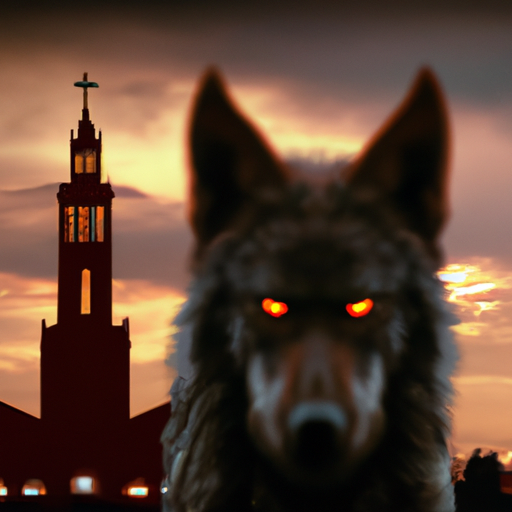
Marcion was a Christian heretic who lived in the 2nd century AD. Marcion rejected the Old Testament and the teachings of the Jewish God, and instead embraced a new God, one of only love and mercy. He also rejected the idea of the Trinity and instead taught that there was only one God. Marcion’s teachings were condemned by the early Church Fathers and he was excommunicated from the Church. Despite this, his teachings had a lasting impact on Christianity and his ideas can still be seen in some modern Christian denominations.
Exploring the Life and Teachings of Marcion, the Heretic

Marcion of Sinope (c. 85-160 CE) was a Christian theologian and teacher who is best known for his heretical views on the nature of God and the teachings of Jesus. He is considered to be one of the most influential heretics in early Christianity, and his false teachings had a profound impact in the development of Christian theology.
Marcion was born in Sinope, a port city on the Black Sea in what is now modern-day Turkey. He was the son of a wealthy ship-owner and merchant, and he was well-educated in Greek philosophy and literature. He was also a student of the Jewish philosopher, Philo of Alexandria.
His teachings were based on his interpretation of the New Testament. He believed that the God of the Old Testament was a cruel and vengeful deity, while the God of the New Testament was a loving and merciful God.
Marcion rejected the idea of the Trinity, believing that the Father, Son, and Holy Spirit were three distinct entities. He also rejected the idea of original sin, believing that humans were born innocent and only became sinful through their own actions.
His teachings were deemed heretical by the early Church, and he was excommunicated in 144 AD. Despite this, his teachings continued to spread and influence Christian thought. His teachings were particularly influential in the development of Gnosticism, a religious movement that emphasized the importance of knowledge and spiritual enlightenment.
Marcion’s teachings have been both praised and condemned throughout history. While some have seen him as a heretic, others have seen him as a visionary who helped to shape the development of Christian theology. Whatever one’s opinion of Marcion, it is clear that his teachings had a profound impact on the development of Christianity.
The Impact of Marcion’s Heresy on Early Christianity

Marcion’s heretical teachings had a profound effect on early Christianity. He rejected the Old Testament and the teachings of the Jewish God, instead advocating for a new religion based on partial teachings of Jesus Christ. This was a radical departure from the traditional Christian beliefs of the time, and it caused a great deal of controversy. Marcion’s followers were excommunicated from the Church, and his teachings were condemned as heresy.
His teachings also had a significant impact on the development of Christian theology. He rejected the idea of a single God, instead advocating for two separate gods: one who was responsible for the Old Testament and one who was responsible for the New Testament. This dualistic theology was a major departure from traditional Christian beliefs, and it had a lasting impact on the development of Christian theology.
Marcion’s teachings also had a major impact on the development of Christian scripture. He rejected the Old Testament and instead advocated for a new canon of scripture. This new canon was known as the Marcionite Canon, and it included the Gospel of Luke, the Acts of the Apostles, and ten of Paul’s epistles. This new canon was widely accepted by Marcion’s followers.
Examining the Rejection of Marcion’s Teachings by the Early Church

The early Church was faced with a easy decision when it came to the teachings of Marcion. His teachings, which included a rejection of the Old Testament and a focus on partial teachings of Jesus, were seen as a threat to the traditional beliefs of the Church. As a result, the Church rejected Marcion’s teachings and declared him a heretic.
He also rejected the idea of the Trinity, believing that Jesus was a separate entity from God the Father. Marcion’s teachings were a challenge to the traditional beliefs of the Church, which held that the Old Testament was inspired by God and that Jesus was part of the Trinity.
The Church argued that Marcion’s teachings were contrary to the teachings of the apostles and the early Church Fathers. They also argued that his teachings were a threat to the unity of the Church and could lead to division and more heresy. The Church’s rejection of Marcion’s teachings was a significant moment in the history of the Church, as it set the tone for how the Church would respond to other heretical teachings in the future.
The Church’s rejection of Marcion’s teachings was a necessary step in order to maintain the unity of the Church and to protect the traditional beliefs of the Church. While Marcion’s teachings were seen as a threat to the traditional beliefs of the Church, the Church’s rejection of his teachings was ultimately a sign of its commitment to preserving the unity of the Church and protecting its traditional beliefs.
The Role of Marcion’s Dualism in His Heresy

Marcion’s dualism was a major factor in his heresy. He proposed a radical new interpretation of the Christian faith. He believed that the God of the Old Testament was a different deity than the God of the New Testament, and that the two were in opposition to one another. This dualistic view of God was at the heart of his heresy.
He argued that the God of the Old Testament was a cruel and vengeful deity, while the God of the New Testament was a loving and merciful one. He believed that the Old Testament God was the creator of the physical world, while the New Testament God was the creator of the spiritual world. This dualistic view of God was in stark contrast to the traditional Christian view of a single, unified God.
Marcion’s dualism also had implications for his view of Jesus. He believed that Jesus was sent by the New Testament God to save humanity from the wrath of the Old Testament God. He argued that Jesus was just a spiritual being, not a physical one, and that His mission was to bring salvation to humanity through his teachings and example.
Marcion’s dualism also had implications for his view of the Bible. He argued that the Old Testament was written by the Old Testament God and was therefore unreliable. He believed that the New Testament was written by the New Testament God and was therefore the only reliable source of truth. This view of the Bible is a stark contrast to the traditional Christian view of the Bible as a unified source of truth.
The Influence of Marcion’s Ideas in Today’s churches.

How does Marcion’s heresies influence the modern church? We can easily see them in a couple of situations.
First, we see the tendency to neglect the Old Testament. The proper way to study the Bible is to read it as a whole, comparing Scripture with Scripture. History, especially biblical history, has been lost in many churches. Many modern churches, like Marcion, believe that the God of the Old Testament was a different deity than the God of the New Testament. A Christ-centered church realizes the importance of both the Old and New Testament. Jesus Himself said to search the Old Testament to learn about Him, Luke 24:25-27. Some modern pastors such as Andy Stanley are following Marcion’s heresy of abandoning the Old Testament. They are abandoning the Word of God.
Second, the emphasis upon God’s love over all of His other attributes. God’s attributes don’t contend against one another for significance. His love doesn’t contradict everything additional He says about Himself. Love isn’t a commodity that God discovered in the New Testament, therefore abandoning His attributes of justice and wrath. There is no transition in God’s character. God does not change, Malachi 3:6 . “Jesus Christ is the same yesterday and today and forever”, Hebrews 13:8 . God is love, but He does not abandon His other attributes in favor of His love. We see many modern churches overemphasize God’s love and ignore His other attributes. That imbalanced view of God is the influence of Marcion’s heresies.


